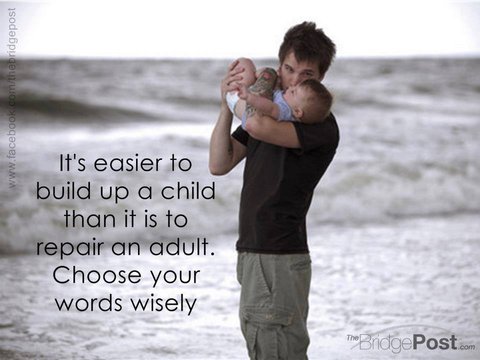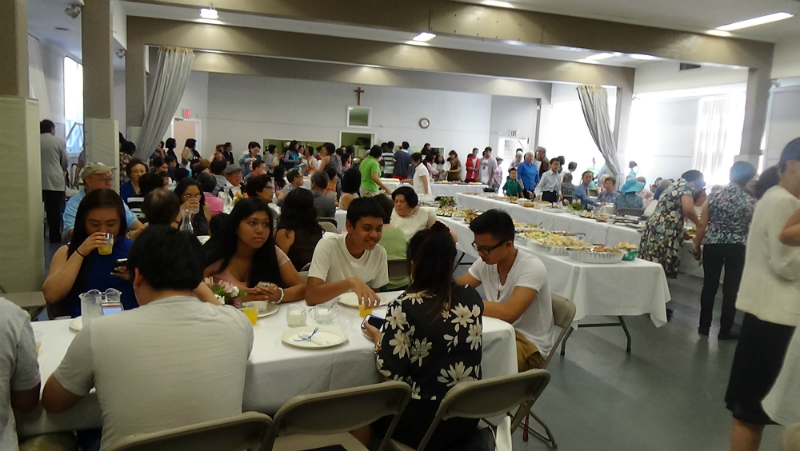Last week, I started off with joke, do you mind if I do it again? I don’t have a lot of them, so enjoy it while it lasts!
There once was a man named John Brown and he hated his name. He felt his name was so common so he told his wife, “When we have a son, I’m going to give him a great name.” So they had a son and named him, “Fantastic.” Fantastic Brown grew up and he too hated his name. He said to his wife, “You know, my name has given me nothing but trouble in my life. Who names their kid ‘Fantastic’? When I die, don’t put my full name on the tombstone, just put ‘Brown.’” So when Fantastic died his wife did as he said and his tombstone just said, “Brown.” But she didn’t feel that did honour to her husband, so she added, “Loved God above all things and faithful husband and father for 50 years,” and whenever people saw that, they said, “That’s fantastic!”
We don’t hear that enough: that we’re fantastic! As far as I can see, the vast majority of people are starved for some affirmation. They rarely hear or feel that they’re good, loved, and accepted. Why are these little acts of kindness so important? Because we’re designed for it by God and we don’t get enough of it.
In today’s second reading, St. Paul shows his love for the Thessalonians. St. Paul is one of the toughest men who ever lived (five times he was whipped with 39 lashes, which is 195 scars), but he still isn’t afraid of showing his love and affection. He says, “We always give thanks to God for all of you” (1 Thess 1:2).
How about writing that in your next text message to your spouse or saying that during your next phone call to your parents? “Hey, I’m thinking of you and always give thanks to God for you.” Thankfulness is a sign that we appreciate another person. Do we really appreciate our spouse, parents, children, brothers and sisters… priest? Then he adds, “Constantly remembering before our… Father your work of faith and labour of love and steadfastness of hope in our Lord Jesus” (1 Thess 1:2-3). It’s good and holy to tell people their good points and affirm them in what they’re doing well.
Now, everyone acknowledges that we need affirmation and affection, and everyone knows that it’s good. Why then do we struggle so much with doing it. Maybe we don’t know how much a difference it makes. But think about it: have you ever received an unexpected letter, postcard, e-mail? There’s that feeling of being special, being cared for. That’s why we’re so quick to open it up and read it. Maybe that’s why we check our e-mail and phones so much. Maybe we’re hoping that someone will have something nice to say to us. Even if they don’t have something nice to say, the fact that they’re communicating with us is a sign they’re interested.
I once sent an e-mail to a lady I knew and told her that I was praying for her all day; during that whole day all my prayers and sacrifices were for her. She wrote back, “Ahhhh.. you made me smile and tear up all at the same time. What a wonderful way for me to start my day today knowing that I am in your prayers.” My friends, it makes a huge difference. It makes a huge difference in everyone’s life even if they don’t acknowledge it (like teenagers), but our children especially need it and it can make all the difference in our lives.
 Another reason why we may struggle with giving affection is because maybe we’ve never been shown much affection or affirmation ourselves. But whatever love we have been shown, it’s important to give that to others. God’s not asking us to do anything exceptional, that’s unnatural to us. He’s asking us to show love and affection in the way we can. We all express affection differently. I know, for example, a priest who got a handshake from his father when he got ordained—that’s it. Some of us are more verbal, some of us write our feelings, others show affection in physical ways.
Another reason why we may struggle with giving affection is because maybe we’ve never been shown much affection or affirmation ourselves. But whatever love we have been shown, it’s important to give that to others. God’s not asking us to do anything exceptional, that’s unnatural to us. He’s asking us to show love and affection in the way we can. We all express affection differently. I know, for example, a priest who got a handshake from his father when he got ordained—that’s it. Some of us are more verbal, some of us write our feelings, others show affection in physical ways.
I once heard of a couple who, after years together, went to a talk on re-kindling their marriage. When they came out, they both resolved to be more kind to each other. As they got to the car, the husband went to his wife’s side of the car and opened the door for her… and she fainted. When she finally came to, she looked up at him and said, “Thank you…” and he fainted!
Don’t assume that people know how much you love them or appreciate them. Many people don’t know because we don’t show it enough. And then, like I just said, we all communicate differently, so while we may think that going to work, driving people around, and doing all these acts of service is enough to show our family that we love them, they might communicate differently. For some people, they need hugs, for others they need to hear, “I love you.”
Finally, even if we do show our affection a lot, the devil and self-doubt will constantly feed us lies: I’m not loved, not good enough. That means we have to be vigilant and remind people of being loved.
Love is always tempted to become routine. Husband and wives, for example, after some years of marriage, don’t express the same affection they once did while dating and on their honeymoon. There are less smiles, fewer embraces, barely any compliments, and little interest shown in the other person. The same can happen between parents and children. Parents have lesser interest in the activities and projects of their children. Children take for granted that their parents sacrifice so much for them. When we grow up, we may even forget to call home and let mom and dad know that we care, or that we’re concerned for them. Now there’s no question here of whether we love our family, we do; but we often neglect to show it.
So, I want to let you know, as your priest, that I’m thankful to God for all of you. You need to hear your priest say it. It’s been a wonderful three months here. I’m thankful for your love for God and your reverence. The fact that everyone receives Communion kneeling is a wonderful sign of love. And whenever I have visitors here, they always comment on how welcoming and hospitable everyone is.
Believe it or not, I found the following in moral theology textbook, it said that for spouses to neglect to show affection for each other is a venial sin. It’s a sin of omission because there’s a lack of love. We say every time we come to Mass, “I confess to Almighty God… in what I have done, and in what I have failed to do.” We should include it in our confessions.
How about this week we try to do three acts of kindness? Three times we look for a way to encourage, affirm or show love. I’ll make it easy for you: your first one can start with me when you leave church!
I wrote an e-mail to my mom yesterday to practice what I preach. I said, “Hi Mom, Good to talk to you just now! Looking forward to seeing you tomorrow and beginning a wonderful vacation! Love you, Fr. Justin” (She calls me ‘Father’).
We’re created for love, affection and encouragement. And it must be expressed.


